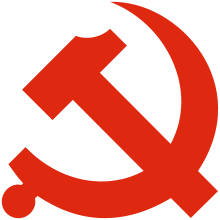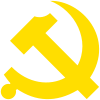United Front Work Department
 | |
| Formation | 1942 |
|---|---|
| Type | Department directly reporting to the Central Committee |
| Headquarters | 135 Fuyou Street, Xicheng District, Beijing |
| Location |
|
Head | Sun Chunlan** |
Executive deputy head | Zhang Yijiong* |
Deputy heads | Wang Zhengwei**, Quan Zhezhu, Chen Xiqing, Tassu, Lin Zhimin, Yin Wanxiang |
Discipline Secretary | Su Bo |
Parent organization | Central Committee of the Communist Party of China |
| Website |
www |
|
**Sub-national rank *Full minister-level rank | |
The United Front Work Department (UFWD) (Chinese: 中共中央统战部) is an agency under the command of the Central Committee of the Communist Party of China. Its main function is to manage relations with the non-Communist Party elite, including individuals and organizations holding social, commercial, or academic influence, or who represent important interest groups, both inside and outside China. In so doing, the UFWD seeks to ensure that these groups are supportive of and useful to Communist Party rule.[1]
History
The United Front Work Department was created during the Chinese civil war, and was reestablished in 1979 under Deng Xiaoping.
Civil war and gaining power
United front policies were most used in two periods before Liberation, namely from 1924 to 1927, and from 1936 to 1945, when the CCP cooperated with the Nationalist Party ostensibly to defeat the Japanese.[2] The simplest formulation of UF work in the period was to "rally as many allies as possible in order to... defeat a common enemy."[2]
In the early years the CCP also used United Front policies to cooperate with "disaffected warlords, religious believers, ethnic minorities, Overseas Chinese, and "minor parties and groups," that is front groups for the Communist Party to appear democratic.[2] The Party's united front strategies were effective against the Nationalists, when combined with military force, "ideological work," and alliance building, which eventually isolated the enemy.
The Party communist agitators were able to persuade "minor parties and groups" in China that the Nationalists were "illegitimate and repressive while the CCP embodied progress, unity, and democracy."[3]
After seizing power the communists continued to deploy united front strategies to train new communist intellectuals, "and, using thought reform based on criticism, began the transformation of the old society intellectuals." This involved violent elimination of what were termed "bourgeois and idealistic political beliefs," to install faith in "class struggle and revolutionary change."[4] The CCP required the intellectuals to have "faith in class struggle and revolutionary change."[4]
Reform-era
In the late 1970s the policy was used for the common cause of economic reform. From there the Party expanded the scope of its work internationally during the reform era, and again following the 1989 Tiananmen Square protests. The department includes a bureau tasked with handling Hong Kong, Macau, Taiwan, and overseas affairs, and articulates the importance of using overseas Chinese populations to promote reunification.[5] It played an important role in building support for "One country, two systems" in Hong Kong during the 1980s and 1990s, operating under the name of the "Coordination Department."[6] The UFWD has been critically described as serving to co-opt non-Communist community leaders outside China, and "using them to neutralize Party critics," sometimes coercively.[7]
Scholar of Chinese political history John P. Burns presents in his book The Chinese Communist Party's Nomenklatura System excerpts from internal party documents demonstrating the role of the UFWD. The UFWD is to "implement better the party's united front policy and to assess and understand patriotic personages in different fields... so that we can arrange for correct placements for them and fully mobilize and bring into play their positive role in the four modernizations and to accomplish the return of Taiwan to the motherland so as to fulfill the cause of uniting the whole country, and to carry forward and solidify the revolutionary, patriotic united front."[8]
The United Front Department was used in the early years of communist rule "to guarantee CCP oversight" over groups that were not directly associated with the Party and government. Those groups, including NGOs, were brought under the authority of the UFWD, whose job it was to “continuing to play its part in mobilizing and rallying the whole people in common struggle” after the Liberation in 1949. When the CCP "shifted its focus from the “mass line” to “class struggle,” the real united front disappeared. While the United Front Department still existed, its duties of uniting with all forces for the “common struggle” shifted mainly to serving the Party’s leadership and “consolidating the proletarian dictatorship,"" according to Brookings Institution Visiting Fellow Zhang Ye.[9]
Operations and affiliations
The United Front Work Department of the Party Central Committee and the State Council is the most direct link between the Communist Party leadership and minority groups in China. The UFWD uses the Chinese People's Political Consultative Conference to carry out its united front activities.
Structure
The United Front consists of eight minor political parties and the All-China Federation of Industry and Commerce. It maintains a close relationship with the State Administration for Religious Affairs, which oversees the five officially sanctioned religions, and plays an active role in managing ethnic and religious minorities, particularly in Tibet.[10]
Overseas operations
Some national intelligence agencies have expressed concern that the mandate and operations of the UFWD can constitute undue interference in other nations' internal affairs.[7] In their book Nest of Spies: the starting truth about foreign agents at work within Canada’s borders, de Pierrebourg and Juneau-Katsuya allege that the United Front Work Department “manages important dossiers concerning foreign countries. These include propaganda, the control of Chinese students abroad, the recruiting of agents among the Chinese diaspora (and among sympathetic foreigners), and long-term clandestine operations.”[11] In 2007, the Communist Party increased the United Front Work Department’s budget by $3 million to further bolster China’s “soft power” abroad.[11]
References
- ↑ Carol Lee Hamrin and Suisheng Zhao, "Decision-Making in Deng's China", (New York, NY: East Gate, 1995.), pp 66 - 67.
- 1 2 3 Gerry Groot, "Managing Transitions: The Chinese Communist Party, United Front Work, Corporatism and Hegemony," Psychology Press, Nov 12, 2003, pp. 2-5
- ↑ Groot 2003, p. ~7
- 1 2 Groot 2003, p. 8
- ↑ United Front Work Department of the CPC Central Committee, '华侨、华人工作的基本任务, March 23, 2009.
- ↑ Christine Loh, "Underground Front: The Chinese Communist Party in Hong Kong", (Hong Kong University Press, 2010), p 148.
- 1 2 Holly Porteous, “Beijing’s United Front Strategy in Hong Kong” Archived September 27, 2011, at the Wayback Machine., Canadian Security Intelligence Service, Commentary 72 (1998)
- ↑ John P. Burns, The Chinese Communist Party's Nomenklatura System: A Documentary Study of Party Control of Leadership Selection, 1979-1984, M.E. Sharpe, 1989. pp. 36-37
- ↑ Zhang Ye, China's Emerging Civil Society, Brookings Institution, June 2003
- ↑ William A. Joseph,"Politics in China: an introduction", (Oxford University Press, 2010), p 169.
- 1 2 Fabrice De Pierrebourg and Michel Juneau-Katsuya, “Nest of Spies: the starting truth about foreign agents at work within Canada’s borders”, HarperCollins Canada, 2009. pp 160 – 162
See also
- United Front (People's Republic of China)
- List of political parties in the People's Republic of China
- Related PRC government agencies
